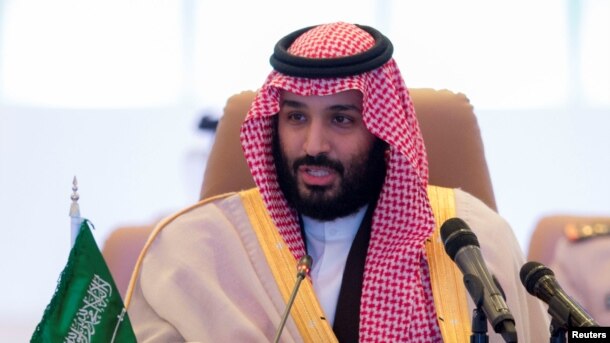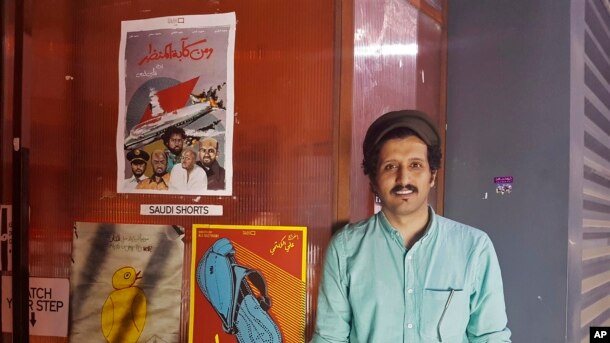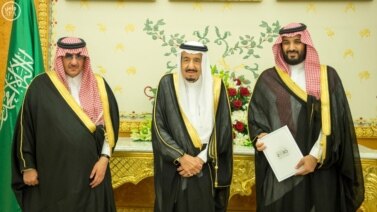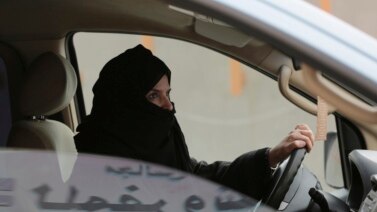
Saudi Arabia’s government says it will lift a ban on movie theaters starting next year.
The move was announced Monday by the country’s ministry of culture and information.
The decision was the latest in a series of social reforms announced in recent months by the conservative Middle East kingdom.
An official statement said the government will begin the licensing process in the next few weeks.
The first cinemas are expected to open by March 2018.
The government ordered the closure of all movie theaters in Saudi Arabia in the early 1980s during a wave of religious conservatism. Saudi Arabia follows Sharia law, which is based on a strict interpretation of Islam.
Many religious leaders see movie theaters as a threat to Saudi Arabia’s culture and religious identity.
But Saudi Crown Prince Mohammed bin Salman has been carrying out several social and economic reforms. Some of them removed parts of the kingdom’s conservative rules.

Saudi Arabia has also announced policy changes to extend more rights to women. These include plans to allow women to drive vehicles and to attend events at all-male sports stadiums.
The reforms are part of bin Salman’s Vision 2030 campaign, which is aimed at boosting spending and creating more local jobs.
Saudi Arabia is the world’s top oil exporter. But it has suffered economic effects from lower oil prices in recent years.
The Saudi government says the opening of movie theaters will add more than $24 billion to the economy and create more than 30,000 jobs by 2030. Officials predict during that year, at least 300 cinemas with about 2,000 screens will be operating.
In announcing the cinema decision, the head of the culture and information ministry said it marked a “watershed moment” in the development of the country’s “cultural economy.”
While the latest decision will allow the licensing of theaters, the government will maintain control over the censoring of films.
Reuters news agency reports the government will make sure the movies are “in line with values and principles in place, and do not contradict with Sharia Laws and moral values in the kingdom.”

Many involved in the country’s film community praised the decision.
“Saudi Arabia is always in the news, but it’s nice to be in the news in this way,” said Los Angeles-based Saudi director Haifaa Al Mansour. In 2012, the director released “Wadjda,” the first full-length feature film shot completely in Saudi Arabia.
“It is a beautiful day in #Saudi Arabia!” she tweeted.
It is a beautiful day in #SaudiArabia! 💚 🇸🇦 Saudi Arabia says cinemas to get licenses in early 2018 https://t.co/rnecGW3ymH #Saudicinema
— Haifaa Al Mansour (@HaifaaMansour) December 11, 2017
Saudi actor and producer Hisham Fageeh also expressed his excitement. “It’s spectacular news. We are in a state of shock,” he said.
Dubai-based shopping center company and cinema operator Majid Al Futtaim was also pleased to hear the announcement. It said it will seek to open the first movie theater in Saudi Arabia.
I’m Bryan Lynn.
Bryan Lynn wrote this story for VOA Learning English. His story was based on reports from the Associated Press, Reuters and Agence France-Presse. Hai Do was the editor.
What are your thoughts on Saudi Arabia’s recent moves to ease some rules? Write to us in the Comments section, and visit our Facebook page.
Words in This Story
cinema - n. a movie theater
screen - n. the surface onto which a picture is projected
watershed - n. moment in time when important change happens
censor - v. to examine books, movies, etc. in order to remove things considered to be offensive, immoral or harmful to society
contradict - v. say the opposite of something someone else says



